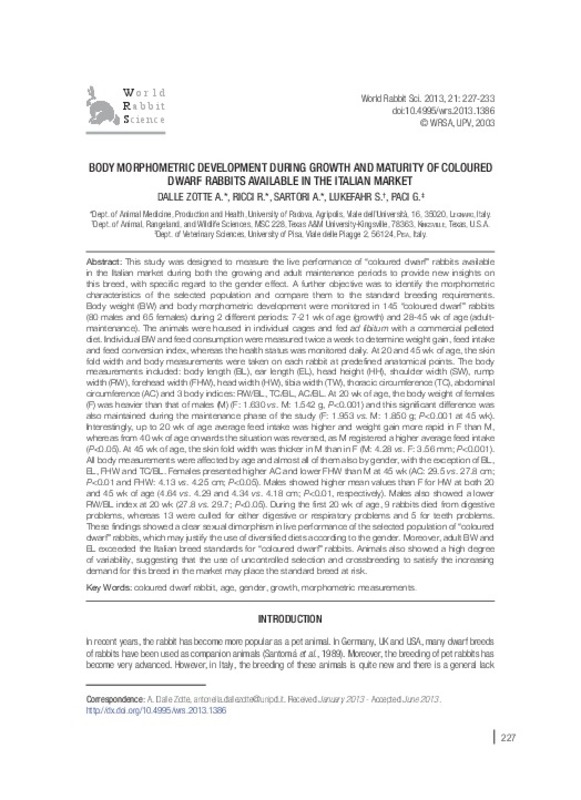|
Resumen:
|
[EN] This study was designed to measure the live performance of "coloured dwarf" rabbits available in the Italian market during both the growing and adult maintenance periods to provide new insights on this breed, with ...[+]
[EN] This study was designed to measure the live performance of "coloured dwarf" rabbits available in the Italian market during both the growing and adult maintenance periods to provide new insights on this breed, with specific regard to the gender effect. A further objective was to identify the morphometric characteristics of the selected population and compare them to the standard breeding requirements. Body weight (BW) and body morphometric development were monitored in 145 "coloured dwarf" rabbits (80 males and 65 females) during 2 different periods: 7-21 wk of age (growth) and 28-45 wk of age (adultmaintenance). The animals were housed in individual cages and fed ad libitum with a commercial pelleted diet. Individual BW and feed consumption were measured twice a week to determine weight gain, feed intake and feed conversion index, whereas the health status was monitored daily. At 20 and 45 wk of age, the skin fold width and body measurements were taken on each rabbit at predefined anatomical points. The body measurements included: body length (BL), ear length (EL), head height (HH), shoulder width (SW), rump width (RW), forehead width (FHW), head width (HW), tibia width (TW), thoracic circumference (TC), abdominal circumference (AC) and 3 body indices: RW/BL, TC/BL, AC/BL. At 20 wk of age, the body weight of females (F) was heavier than that of males (M) (F: 1.630 vs. M: 1.542 g, P<0.001) and this significant difference was also maintained during the maintenance phase of the study (F: 1.953 vs. M: 1.850 g; P<0.001 at 45 wk). Interestingly, up to 20 wk of age average feed intake was higher and weight gain more rapid in F than M, whereas from 40 wk of age onwards the situation was reversed, as M registered a higher average feed intake (P<0.05). At 45 wk of age, the skin fold width was thicker in M than in F (M: 4.28 vs. F: 3.56 mm; P<0.001). All body measurements were affected by age and almost all of them also by gender, with the exception of BL, EL, FHW and TC/BL. Females presented higher AC and lower FHW than M at 45 wk (AC: 29.5 vs. 27.8 cm; P<0.01 and FHW: 4.13 vs. 4.25 cm; P<0.05). Males showed higher mean values than F for HW at both 20 and 45 wk of age (4.64 vs. 4.29 and 4.34 vs. 4.18 cm; P<0.01, respectively). Males also showed a lower RW/BL index at 20 wk (27.8 vs. 29.7; P<0.05). During the first 20 wk of age, 9 rabbits died from digestive problems, whereas 13 were culled for either digestive or respiratory problems and 5 for teeth problems. These findings showed a clear sexual dimorphism in live performance of the selected population of "coloured dwarf" rabbits, which may justify the use of diversified diets according to the gender. Moreover, adult BW and EL exceeded the Italian breed standards for "coloured dwarf" rabbits. Animals also showed a high degree of variability, suggesting that the use of uncontrolled selection and crossbreeding to satisfy the increasing demand for this breed in the market may place the standard breed at risk.
[-]
|
|
Agradecimientos:
|
This study was supported by Valman s.r.l., Isola Vicentina (VI), Italy. The authors wish to thank Paula Bohatir,
Maud Meurant, Pascal Stephano and Barbara Contiero for their technical support.
|








